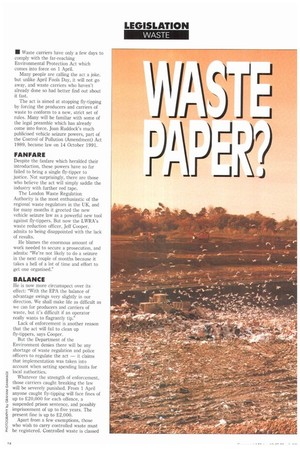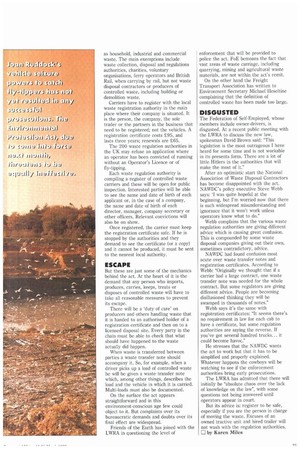LEGISLATION
Page 26

Page 27

If you've noticed an error in this article please click here to report it so we can fix it.
WASTE
• Waste carriers have only a few days to comply with the far-reaching Environmental Protection Act which comes into force on 1 April.
Many people are calling the act a joke. but unlike April Fools Day, it will not go away, and waste carriers who haven't already done so had better find out about it fast.
The act is aimed at stopping fly-tipping by forcing the producers and carriers of waste to conform to a new, strict set of rules. Many will be familiar with some of the legal preamble which has already come into force. Joan Ruddock's much publicised vehicle seizure powers, part of the Control of Pollution (Amendment) Act 1989, became law on 14 October 1991.
FANFARE
Despite the fanfare which heralded their introduction, these powers have so far failed to bring a single fly-tipper to justice. Not surprisingly, there are those who believe the act will simply saddle the industry with further red tape.
The London Waste Regulation Authority is the most enthusiastic of the regional waste regulators in the UK, and for many months it greeted the new vehicle seizure law as a powerful new tool against fly-tippers. But now the LWRA's waste reduction officer, Jeff Cooper, admits to being disappointed with the lack of results.
He blames the enormous amount of work needed to secure a prosecution, and admits: "We're not likely to do a seizure in the next couple of months because it takes a hell of a lot of time and effort to get one organised."
BALANCE 8
a.
He is now more circumspect over its effect: "With the EPA the balance of advantage swings very slightly in our direction. We shall make life as difficult as we can for producers and carriers of waste, but it's difficult if an operator really wants to flagrantly tip."
Lack of enforcement is another reason that the act will fail to clean up fly-tippers, says Cooper.
But the Department of the Environment denies there will be any shortage of waste regulation and police officers to regulate the act — it claims that implementation was taken into account when setting spending limits for local authorities.
Whatever the strength of enforcement, those carriers caught breaking the law will be severely punished. From 1 April anyone caught fly-tipping will face fines of 1 up to £20,000 for each offence, a suspended prison sentence, and possibly imprisonment of up to five years. The present fine is up to £2,000.
Apart from a few exemptions, those who wish to carry controlled waste must be registered. Controlled waste is classed as household, industrial and commercial waste. The Main exemptions include waste collection, disposal and regulations authorities, charities, voluntary organisations, ferry operators and British Rail, when carrying by rail, but not waste disposal contractors or producers of controlled waste, including building or demolition waste.
Carriers have to register with the local waste registration authority in the main place where their company is situated. It is the person, the company, the sole trader or the partners in the business that need to be registered; not the vehicles. A registration certificate costs £95, and lasts three years; renewals are £65.
The 200 waste regulation authorities in the UK may refuse an application where an operator has been convicted of running without an Operator's Licence or of fly-tipping.
Each waste regulation authority is compiling a register of controlled waste carriers and these will be open for public inspection. Interested parties will be able to see the name and date of birth of each applicant or, in the case of a company, the name and date of birth of each director, manager, company secretary or other officers. Relevant convictions will also be on show.
Once registered, the carrier must keep the registration certificate safe. If he is stopped by the authorities and they demand to see the certificate (or a copy) and it cannot be produced, it must be sent to the nearest local authority.
ESCAPE
But these are just some of the mechanics behind the act. At the heart of it is the demand that any person who imports, produces, carries, keeps, treats or disposes of controlled waste will have to take all reasonable measures to prevent its escape.
There will be a 'duty of care' on producers and others handling waste that it is handed to an authorised holder of a registration certificate and then on to a licensed disposal site. Every party in the chain must be able to check that what should have happened to the waste actually did happen.
When waste is transferred between parties a waste transfer note should accompany it. So, for example, when a driver picks up a load of controlled waste he will be given a waste transfer note which, among other things, describes the load and the vehicle in which it is carried. Multi-loads must also be documented.
On the surface the act appears straightforward and in this environment-conscious age few could object to it. But complaints over its bureaucratic demands and doubts over its final effect are widespread.
Friends of the Earth has joined with the LWRA in questioning the level of enforcement that will be provided to police the act. I4'oE bemoans the fact that vast areas of waste carriage, including quarrying, mining and agricultural waste materials, are not within the act's remit.
On the other hand the Freight Transport Association has written to Environment Secretary Michael Heseltine complaining that the definition of controlled waste has been made too large.
DISGUSTED
The Federation of Self-Employed, whose members include owner-drivers, is disgusted. At a recent public meeting with the LWRA to discuss the new law, spokesman David Brown said: "This legislation is the most outrageous I have heard for some time and is not workable in its presents form. There are a lot of little Hitlers in the authorities that will make the most of it."
After an optimistic start the National Association of Waste Disposal Contractors has become disappointed with the act. NAWDC's policy executive Steve Webb says: 'I was quite hopeful at the beginning, but I'm worried now that there is such widespread misunderstanding and ignorance that it won't work unless operators know what to do."
Webb complains that the various waste regulation authorities are giving different advice which is causing great confusion. This is compounded by some waste disposal companies giving out their own, sometimes contradictory, advice.
NAWDC had found confusion most acute over waste transfer notes and registration certificates. According to Webb: "Originally we thought that if a carrier had a large contract, one waste transfer note was needed for the whole contract. But some regulators are giving different advice. People are becoming disillusioned thinking they will be swamped in thousands of notes."
Webb says it's the same with registration certificates: "It seems there's no requirement in law for each cab to have a certificate, but some regulation authorities are saying the reverse. If you've got several hundred trucks... it could become havoc."
He stresses that the NAWDC wants the act to work but that it has to be simplified and properly explained. Whatever happens the cowboys will be watching to see if the enforcement authorities bring early prosecutions.
The LWRA has admitted that there will initially be "absolute chaos over the lack of knowledge on the law", with some questions not being answered until operators appear in court.
But its advice is: register to be safe, especially if you are the person in charge of moving the waste. Excuses of an owned tractive unit and hired trailer will not wash with the regulation authorities. 0 by Karen Miles




















































































